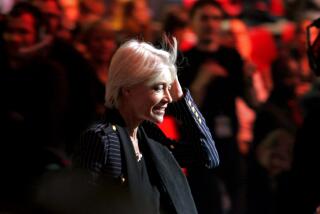PJ Harvey Tells Her ‘Stories’ With a Therapeutic Conviction
- Share via
“I walk on concrete, I walk on sand, but I can’t find a safe place to stand,” PJ Harvey sang Thursday at the Knitting Factory Hollywood. “I’m scared baby, I wanna run, the world’s crazy, gimme the gun.”
Harvey’s song, “Big Exit,” is from last year’s “Stories From the City, Stories From the Sea” album and has nothing to do with the recent terrorist attacks, but, as she performed it, you couldn’t help think that it did. Such is the elasticity of great art.
When all is right in the world, you can get along for a while on a musical junk food diet. But during moments of confusion and trial, there is an understandable hunger for works that can help clarify and inspire.
Several fans at the sold-out show Thursday said it was their first night in a club since watching the endless replays of the East Coast attacks and then seeing the nation try to regain emotional footing.
Some fans were looking for forceful, explosive rock ‘n’ roll to help exorcise the anxiety. Others wanted more thoughtful, therapeutic strains. Harvey is a master at delivering music on both levels.
Because of its dark, fearful imagery, “Big Exit” would likely pop up on the Clear Channel radio chain’s list of songs that listeners might find inappropriate these days. But the number drew the biggest response of the evening because it somehow reflects the nation’s struggle to deal with a new sense of vulnerability and responsibility.
Indeed, the song would be the perfect soundtrack to the most haunting image that has come out of the New York tragedy: the Stan Honda photo of a frightened, dust-covered woman whose confusion seems to symbolize the nation’s struggle to discern precisely what has happened.
If that song defined the evening, several others from the “Stories” album also seemed to address, almost eerily, the same topical theme. In “This Is Love,” Harvey sang, “Does it have to be a life full of dread?” In “Good Fortune,” optimism seemed to take a reverse meaning on this occasion: “Things I once thought unbelievable in my life/Have all taken place.”
One reason the songs from “Stories” seem to tie so easily into the day’s headlines is that they were written after Harvey spent considerable time in New York. Even if the songs are about different situations, the underlying human emotions are deep enough to make them take on the added nuances.
Pop observers have spent decades trying to find artists worthy of the new Bob Dylan tag, but few have sought to proclaim a new Joni Mitchell, another landmark artist whose music examines social and sexual politics with uncommon literary flair and depth.
While Patti Smith and Sinead O’Connor have examined the human condition with enough originality and insight to be considered the Joni Mitchells of their generations, no one has deserved the comparison as fully as Harvey.
The English singer-songwriter’s music has evolved gracefully over the years. In her early club dates, she led a blues-rock trio that played with a Led Zeppelin-like fury, and her sexually charged lyrics had an in-your-face aggressiveness.
By the time of 1995’s “To Bring You My Love,” she had started reaching for more graceful and sophisticated musical textures, and the lyrics’ rich imagery and ambition took on the fire-and-brimstone declarations of a gothic novel. In “Stories,” Harvey displays a more tuneful, pop accessibility without sacrificing character or depth. The writing is deeply personal but more straightforward than ever. There is also more optimism than in previous Harvey albums, and the comforting imagery of “Horses in My Dreams,” a song about breaking through the dread, had an especially cleansing feel Thursday.
Despite the psychodrama in much of her music, including such early numbers as “Rid of Me” and “Sheela-Na-Gig,” Harvey (who was also scheduled to headline the Hollywood Palladium on Friday), generally delivered her songs with a cool precision, rather than lose herself in the emotion of the songs. Backed by a versatile four-piece band, she simply stood at the microphone, often braced with an electric guitar.
Between songs, she rarely said anything other than “thank you.” There was no mention of the larger tensions in the world or a comment on how the songs take on wider meaning in light of last week’s events. At the end of the evening, she just said good night with a tender, “Take care of yourselves.”
More to Read
The biggest entertainment stories
Get our big stories about Hollywood, film, television, music, arts, culture and more right in your inbox as soon as they publish.
You may occasionally receive promotional content from the Los Angeles Times.










